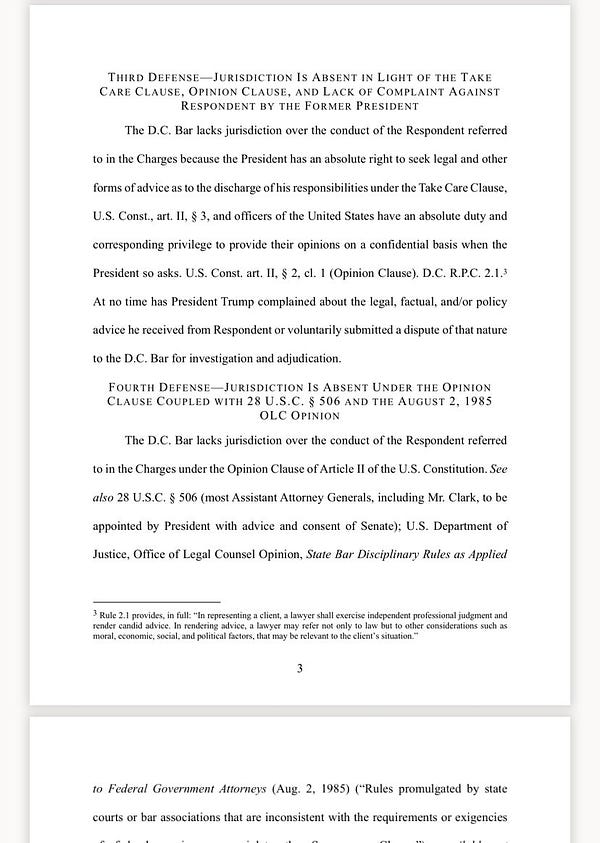It appears that John Durham's investigation into why the FBI opened an investigation into the ties between the 2016 Trump campaign and Russian operatives is coming to an end.
Durham's investigation was a prime example of Trump's attempt to use the Department of Justice not to enforce the nation's laws, but to hurt his enemies, a charge former U.S. attorney for the Southern District of New York Geoffrey Berman has made in his new book. Trump, Berman said, wanted his friends protected and his enemies—including former secretaries of state John Kerry and Hillary Clinton—prosecuted.
In April 2019, the month after Special Counsel Robert Mueller's Report On The Investigation Into Russian Interference in the 2016 Presidential Election finally saw daylight, Attorney General William Barr tapped United States Attorney for the District of Connecticut John Durham to investigate the circumstances under which the FBI began to look into Russian interference in the election in the first place.
The appointment was clearly an attempt to continue to distract people from the results of the Mueller report, which Barr had had an instrumental role in diminishing. Barr took office on February 14, 2019, just as Mueller was finishing his report. As Mueller's superior, Barr got a copy of the report before anyone else, and he spun it to the media, claiming it exonerated the president and his team. In fact, Mueller established that Russia had illegally intervened in the election to benefit Trump and that the campaign "expected it would benefit electorally from information stolen and released through Russian efforts." Mueller complained to Barr about the spin, but it was too late: the public had bought it.
Trump and his allies jumped on Durham's investigation, promising it would prove that FBI agents were part of a "Deep State" and that Durham would uncover "the crime of the century." In December 2020, after Trump had lost the election, Barr revealed that he had made Durham a special counsel the previous October so that Durham could continue his work into the next administration.
But the investigation itself fizzled. Durham pressed charges against only three people. One pleaded guilty to altering an email and was sentenced to probation and community service. A grand jury alleged two others lied to the FBI. One was acquitted of the charges last May. The other is supposed to go on trial next month but has asked a judge to throw out the case for lack of evidence. But Durham's three-year investigation did provide talking points for those attacking the FBI's Russia investigation, keeping alive Trump's false claims that it was just a "witch hunt."
Trump's politicization of the Department of Justice was a profound attack on the principles of democracy. Using the law to attack enemies is a hallmark of authoritarians—just ask opposition leader Alexsei Navalny in Russia, who has been sentenced to incarceration on trumped-up charges to get him out of Russian president Vladimir Putin's way—while it also encourages lawbreaking from those who don't fear legal consequences.
We have seen that sense of being above the law today in stories about the willingness of Mississippi officials, including former governor Phil Bryant, to work with former NFL player Brett Favre to divert about $5 million in federal welfare funds from helping people in poverty to building a volleyball facility at the University of Southern Mississippi, where his daughter was a volleyball player.
We have seen it in the anger that Trump allies show when law enforcement treats them as it would anyone suspected of lawbreaking. MyPillow chief executive officer Mike Lindell explained by video that yesterday FBI agents took his phone and that "what we've done is weaponize the FBI…it's disgusting…." Agents executed the search warrant as part of a federal investigation into the alleged breach of Colorado voting machines.
We have seen it in Jeffrey Clark's response today to ethics charges brought against him by the D.C. Bar. Clark was employed by the Department of Justice in late 2020, when he worked to swing the department behind Trump's lie that he had won the election, a shift that would have utterly destroyed the rule of law in the U.S. Now he claims the D.C. Bar cannot punish him because normal rules of behavior don't apply. In a filing today, he told the bar: "[T]the President has an absolute right to seek legal and other forms of advice…and officers of the United States have an absolute duty and corresponding privilege to provide their opinions on a confidential basis."
The turning of the courts into a tool for partisan advantage has been part of the Republican project since 1986, when Reagan's attorney general Edwin Meese vowed to "institutionalize the Reagan revolution so it can't be set aside no matter what happens in future presidential elections." That partisan use of the courts inspired then–Senate majority leader Mitch McConnell (R-KY) to help Trump replace about 30% of the federal bench and to swing the Supreme Court to the far right with three new justices.
An examination by Politico's Josh Gerstein and Kyle Cheney shows that Trump's judges were less experienced on the bench and had spent more time in politics than the judges appointed by other presidents, and that Trump expected them to side with him, calling them "my judges." "If it's my judges, you know how they're gonna decide," he told evangelical leaders in 2016. And some of them have, indeed, sided with the former president in surprising ways, most recently when Judge Aileen Cannon, confirmed after Trump lost the 2020 election, agreed with his request for a special master to review the government documents recovered by the government from Mar-a-Lago.
Trump's judges have revealed a willingness to break precedent to achieve political ends, and nowhere is that clearer than in the willingness of the Supreme Court to replace long-settled law with their own preferences, most notably in their Dobbs v. Jackson Women's Health decision overturning the 1973 Roe v. Wade decision protecting the right to abortion, but also in West Virginia v. EPA, limiting Congress's ability to delegate regulatory authority to agencies, and so on.
That replacement of settled law with what looks to be political preferences has tanked popular faith in the Supreme Court. On Monday, Justice Elena Kagan noted that, "Judges create legitimacy problems for themselves…when they instead stray into places where it looks like they're an extension of the political process or when they're imposing their own personal preferences." People should be able to expect that "changes in personnel don't send the entire legal system up for grabs."
President Joe Biden appears to be trying to restore the rule of law to the Department of Justice, going out of his way to note that he is not involved with Attorney General Merrick Garland's decisions. Increasingly, it looks like Garland's Justice Department is bearing down on those who considered themselves untouchable.
The trials and convictions of those who participated in the January 6 attack on the U.S. Capitol continue. Yesterday, three more rioters were found guilty of multiple charges. Twenty-five year old Patrick McCaughey III, of Ridgefield, Connecticut, who crushed Metropolitan Police Department officer Daniel Hodges in a doorway, faces decades in prison.
Also today, Pamela Brown, Evan Perez, Jeremy Herb, and Kristen Holmes reported at CNN that not all of Trump's loyalists are still acting as if they are above the law. Trump's White House chief of staff Mark Meadows has complied with a Department of Justice subpoena.
Perhaps most revealing of the restoration of the rule of law at the Justice Department is that former attorney general Barr has been on the television circuit defending the FBI and Biden's Department of Justice from Trump's fury over the FBI's execution of a search warrant at Mar-a-Lago that yielded documents—or empty folders—bearing the highest classified markings.
That is, the same man who sponsored Durham's political mission has recently begun to speak up for the rule of law.
—
Notes:
https://www.nytimes.com/2022/09/08/nyregion/geoffrey-berman-trump-book.html
https://www.nytimes.com/2021/11/04/us/politics/igor-danchenko-arrested-steele-dossier.html
https://www.cnn.com/2021/01/29/politics/kevin-clinesmith-sentencing-durham/index.html
https://www.cnn.com/2022/09/14/politics/john-durham-investigation-update/index.html
https://www.nbcnews.com/politics/politics-news/brett-favre-texts-show-role-mississippi-welfare-scandal-rcna47654
https://www.washingtonpost.com/investigations/2022/09/14/mike-lindell-phone-fbi-mypillow/
https://apnews.com/article/brett-favre-welfare-money-ed4cd2825a366af603634c82a4ddddbf
https://www.politico.com/news/r2022/09/12/trump-judges-mar-a-lago-courts-00056071
https://www.washingtonpost.com/opinions/2022/09/14/kagan-speech-supreme-court-legitimacy-roberts/
https://www.latimes.com/opinion/story/2022-09-09/william-barr-donald-trump-legacy-russia-mar-a-lago-search
https://talkingpointsmemo.com/news/all-the-people-who-trump-tried-to-make-the-feds-investigate-for-being-mean-to-him
https://www.mediamatters.org/fox-news/fox-fueled-durham-probe-ending-whimper
https://www.cbsnews.com/news/patrick-mccaughey-convicted-7-felonies-pinned-daniel-hodges-in-door-frame-january-6-capitol-riot/
https://www.latimes.com/archives/la-xpm-1985-01-26-mn-13684-story.html
https://www.cnn.com/2022/09/14/politics/mark-meadows-subpoena-justice-department-january-6/index.html
Share
 Sarah N. Lynch @SarahNLynch
Sarah N. Lynch @SarahNLynch



No comments:
Post a Comment